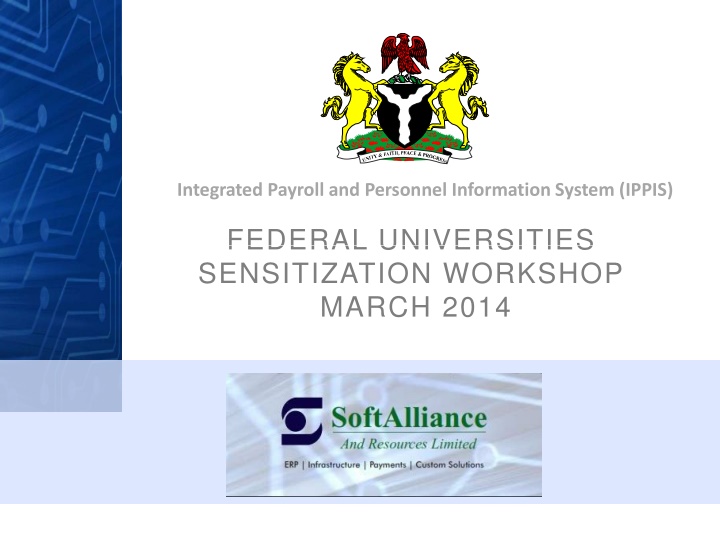
IPPIS: Federal Universities Sensitization Workshop Overview
Learn about the Integrated Payroll and Personnel Information System (IPPIS) introduced by the Federal Government of Nigeria. Discover its objectives, status, key functions, and design as outlined in the workshop materials from March 2014.
Uploaded on | 1 Views
Download Presentation

Please find below an Image/Link to download the presentation.
The content on the website is provided AS IS for your information and personal use only. It may not be sold, licensed, or shared on other websites without obtaining consent from the author. If you encounter any issues during the download, it is possible that the publisher has removed the file from their server.
You are allowed to download the files provided on this website for personal or commercial use, subject to the condition that they are used lawfully. All files are the property of their respective owners.
The content on the website is provided AS IS for your information and personal use only. It may not be sold, licensed, or shared on other websites without obtaining consent from the author.
E N D
Presentation Transcript
Integrated Payroll and Personnel Information System (IPPIS) FEDERAL UNIVERSITIES SENSITIZATION WORKSHOP MARCH 2014
What is IPPIS? IPPIS is one of the Transformation agenda of the Federal Government of Nigeria with the aim of creating a centralized database system for Nigerian Public Service with single, accurate source of Employee information that provides integration with other business applications. 2
IPPIS Objectives 1. Provide a centralized database to aid Governments manpower planning and decision making 2. Facilitate automation & storage of personnel records to support monitoring of staff emolument payments against budget. 3. Prevent wastage and leakages by ensuring staff remuneration is based on factually correct information. 4. Ensure prompt payment of salaries directly to Employees Account with appropriate deductions and remittances of 3rd party payments (e.g. Tax, Pension, Cooperatives, Union Dues and Bank Loans) 3
IPPIS Status February 2014 1. 257,516 Employees on IPPIS as at March 2014 Payroll 218,330 Active Employees 2. 308 Ministries Departments Agencies on IPPIS 123 Non Core Agencies 17 Teaching Hospitals and Medical Centers 10 Colleges of Agriculture and Veterinary Science 3. 29 MDAs on Trial Payroll Today 4
IPPIS DESIGN IPPIS IPPIS Training Training OLM Human Human Resources Resources Payroll Payroll SSHR SSHR
KEY PAYROLL FUNCTIONS Quick Pay Form People Form Payroll Run Address form Assignment form Pay slips and other Reports Pay method form End Employment Grade and Step Placement form
SAMPLE PAYSLIPFOR PRIMARY ASSIGNMENT
MAIN SECURITY FEATURES Application Database Audit Trail of All Activities in the Application. Password complexity verification, Enforced case sensitivity, Encryption of Data Exports/Backups, Data Masking, Stronger password hashing algorithm Security Profile: Hierarchical Partitioning of the Application. Oracle User Management : Role Based Access Control, Delegated Administration Network Security: Secure Node Validation, IP Restrictions, Connection Timeout for idle Sessions. Application Password Complexity Algorithm & Setup. 14
KNOWN ISSUES/RESOLUTIONS Underpayments, Overpayments & Non payments for few employees during initial payment Care during online registration with verification of registration slip before capturing, correct Bank details, NUBAN Account number, nominal roll and trial Payroll correction Resistance, Reluctance & Refusal from some Interest groups Sensitization of all stake holders and Interest groups. Lack of awareness and communications gaps in MDAs Change Management programmes for implementing MDAs. Lack of ICT Skills in payroll & personnel units of MDAs Continuous Training for Subject Matter Expert & End Users. 15
NUS CONCERNS Enrolment/Payment of Staff on overseas training Relevant documents in employees files will be scanned and the University Authority will certify pending the time the employee returns from abroad and be captured. Impediment of ability to hire new staff immediately Hiring control remains with each institution and new staff will be captured at the nearest Federal Pay office to the Institution No provision for outsourced services (cleaning, security etc.) Outsourced services are outside IPPIS May hamper the ability of each institution to discipline its staff Staff discipline remains with the control of each institution
NUS CONCERNS CONTD... Payroll adjustments will now be done centrally requiring expensive staff travel to Abuja Updates & variations to payroll will be handled by University payroll team 3rd Party deductions from source (Union, Cooperative etc.) not possible All legitimate 3rd party payments can be done on IPPIS Government can withhold salaries due to strikes, collective bargaining etc. Government directives are mandatory within and without IPPIS Impediment of University ability to staff new programs IPPIS and universities will work together on Staffing new programs
IDENTIFIED REQUIREMENTS FOR NUS University Autonomy Non-Permanent Staff Appointments Sabbatical Contracts (Professor Emeritus, expatriates, etc) Honorary Consultants/Lecturers Visiting/Part-time lecturers Professorial promotions (Arrears payments)
IPPIS NUS CUSTOMISATION NO IMPACT ON UNIVERSITY AUTONOMY! IPPIS system can be configured to pay professorial arrears address NUS annual increment of (Sep/Oct) instead of January allow primary wages and sabbatical allowances simultaneously to have separate template to accept: sabbatical and tenured appointments contract/honorary and visiting Lecturers handle primary and secondary appointments
TODAYS QUESTIONS What s missing? Where else can we improve?
QUESTIONS 21
